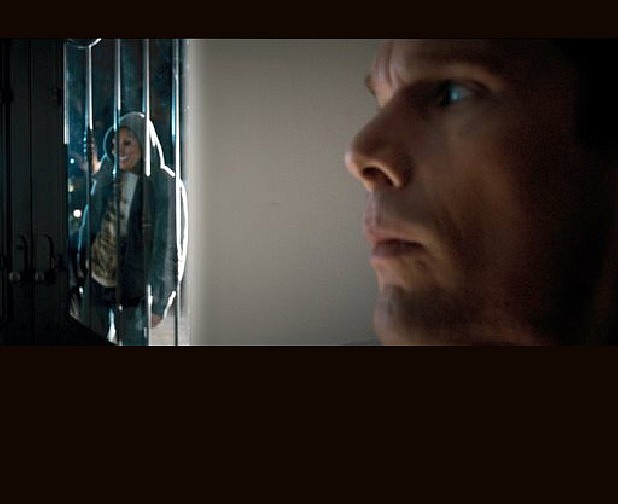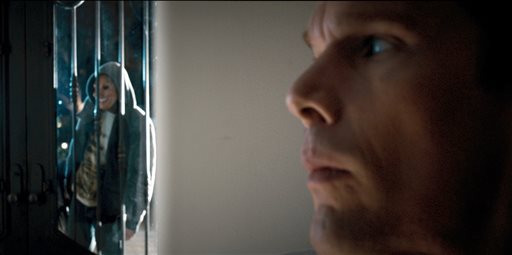LOS ANGELES - Characters are frequently urged to "release the beast" in "The Purge," a high-concept home-invasion shocker set in a future where one night a year, all crime is legal. But what should be a clammy exercise in claustrophobic, queasy tension becomes, in the hands of writer/director James DeMonaco, an underpowered compendium of over-familiar scare tactics and sledgehammer-subtle social satire. The intriguingly nightmarish premise may well rustle up a decent opening weekend for a picture that comes with the imprimatur of producer Michael Bay before the lukewarm word of mouth hastens its trip to DVD and VOD.
The hostiles-in-the-house sub-genre is, of course, ideal for small-screen viewing, turning the comforting spaces of the domestic environment into shadowy hiding places for miscreants. Five years ago, Bryan Bertino's "The Strangers" opened one weekend earlier to reap healthy returns, and DeMonaco tips his hat to that predecessor by having his psychopaths also don spooky masks as they come-a-calling on their middle-class suburban prey.
But where Bertino scored by keeping external details to an absolute minimum, DeMonaco overloads "The Purge" with all kinds of cumbersome exposition, mostly delivered via TV-news broadcasts. It's 2022, and in the United States, crime and poverty have dwindled drastically since the election of the "New Founding Fathers" - presumably in 2014.
This thinly veiled fictional version of the Tea Party ("a nation reborn!") wasted no time in introducing "The Purge," a nationwide catharsis, which runs for 12 hours starting at 7 p.m. on March 21, during which time the violent, even homicidal unleashing of rage is positively encouraged as a patriotic duty.
While the plausibility of such an extreme scenario springing up in less than a decade is debatable, more feasible is the accompanying boom in private security spending as citizens who can afford to barricade themselves into their homes do so. This lines the pockets of folks like security-biz entrepreneur James Sandin (Ethan Hawke), who has equipped his own sprawling residence with the latest intruder-repelling technology. But no "lockdown" is airtight, and the Sandin family find themselves under siege when they provide sanctuary to a homeless man (Edwin Hodge). This unnamed, injured fellow is first seen fleeing a well-heeled lynch mob led by a preppy individual identified in the credits as "Polite Stranger" (Rhys Wakefield).
DeMonaco has spoken of his debt to Sam Peckinpah's "Straw Dogs" and John Carpenter's "Assault on Precinct 13," the latter providing Hawke with a star vehicle via the DeMonaco-scripted 2005 remake. (Hawke was also the lead in DeMonaco's little-seen directorial debut "Staten Island.") The suburban-insecurity theme also stirs memories of David Fincher's "Panic Room," Jonathan Kaplan's "Unlawful Entry" and even Neil Labute's "Lakeview Terrace"; the barely concealed bloodlust of the bourgeoisie recalls "The Last House on the Left"; while the idea of state-sanctioned, carefully contained mayhem was executed on a grander scale in "The Hunger Games" and "Rollerball."
The Purge never threatens to become more than the sum of its various parts, however. And it's frustrating that while we hear about the horrors unfolding elsewhere in the country, all we see is brief glimpses of surveillance-camera footage that hint at unbridled savagery. Instead, DeMonaco seldom strays beyond the thresholds of the Sundin's mansion, with characters forever wandering in the dark down long corridors or through different rooms.
Jolts tend to be of the "boo!" and "he's behind you!" variety, their impact lessened rather than amplified by Sebastian Sheehan Visconti's crash-bang sound design. Violence and bloodshed are somewhat restrained given the R rating. DeMonaco seems more engaged by the bluntly allegorical aspects of a tale where America has been segregated into secure "haves" and terrified "have-nots."
The fact that Hodge's stranger is a homeless black man - pursued by Wakefield's upper-class blond yuppie - adds a racial dimension to proceedings that DeMonaco doesn't seem to know how to handle. And it gets lost amid a sequence of bloody torture, perhaps inspired by the maltreatment of prisoners at Abu Ghraib. "You are making this much more difficult than it needs to be!" yelps Hawke after urging Lena Headey to stick a letter opener into their guest's gaping wound, an inadvertently comic moment that torpedoes what should be a grueling dissection of suburban middle-class hypocrisies.
Rating: R for strong disturbing violence and some language
Running time: 85 minutes

